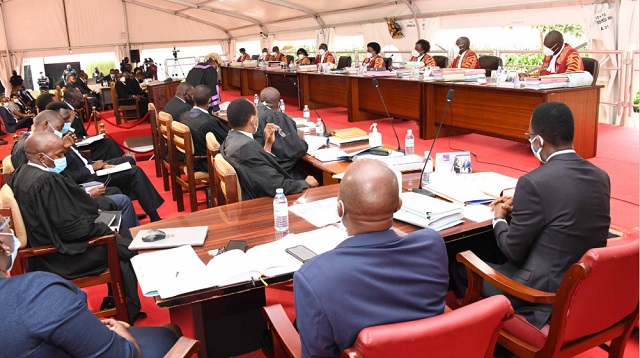
Kampala, Uganda | THE INDEPENDENT | The Supreme Court in Kampala has ordered for written submissions in the case in which the Attorney General wants an interim injunction halting the implementation of a decision by the Constitutional Court allowing lawyers to participate in Small Claims.
Small Claims are cases whose subject value does not exceed 10 million shillings and such matters are heard before Grade One Magistrates.
The three member panel comprising of Justice Rubby Opio Aweri, Percy Night Tuhaise and Mike Chibita ordered the Attorney General’s representative, State Attorney Patricia Mutesi and the lawyers of Israel Ssejjemba whose petition resulted into the orders of Constitutional Court to put in written submissions before the end of Friday and the ruling will be delivered next week on Tuesday.
Small Claims are cases whose subject value does not exceed 10 million shillings and such matters are heard before Grade One Magistrates and both the person with a complaint and the one being sued were all previously representing themselves, until the October 5th 2021 unanimous decision by the Constitutional Court which paved way for the lawyers to participate in such proceedings.
The decision was made by a Panel led by Justice Fredrick Egonda-Ntende who quashed rule 8(2) and 3 of the Judicature Small Claims Procedure rules of 2011 which was barring Advocates from small claims proceedings and barring cross examination.
The Justices argued that the said rules contravene with the Constitutional right to fair hearing which also includes the right to legal representation.
The decision followed a successful petition filed by Israel Ssejemba filed in 2014 against the Attorney General after who obtained summons from Makindye Magistrates Court requiring him to respond to a claim of 9.5 million Shillings. But when he asked his lawyers to represent him was told that they are by law barred from small claims courts, hence petitioning the Constitutional Court to make a declaration that it was illegal to exclude lawyers in such proceedings and accordingly ,the court ruled in his favor.
However, not happy with the decision, the Attorney General on December 1st 2021 filed an application for interim stay of execution of the orders of the aforementioned Constitutional Court decision until a substantive application that is pending before the Supreme Court is heard and determined.
The Attorney General through State Attorney Mutesi notes that there is an imminent threat to implement the judgement of the Constitutional Court before hearing of the substantive application for stay of execution.
The Attorney General’s application is supported by an affidavit of Lillian Bucyana the Deputy Registrar of the High Court in charge of the Registry for Small Claims Procedure and she says that there is a serious threat to implement the constitutional court decision arguing that a number of lawyers have since filed notices seeking to represent litigants in the various Small Claims Courts.
“That there is need to preserve the status quo because there are numerous cases pending determination in the small claims courts and indigent and other litigants in these cases will be adversely affected by lengthened procedures and legal costs which were not originally envisaged under the small claims procedure if the order is not stayed”, reads Bucyana’s affidavit.
It adds that, “If the interim order staying execution is not granted there will be irreparable injury caused to litigants who cannot afford to pay legal representation and or for lengthened procedures in addition to the opposite parties’ legal costs arising from the small claims procedure which were not originally envisaged.”
According to the Attorney General, if an interim order for stay of execution is not granted, there will be irreparable injury suffered by indigent and other users of the small claims procedure.
Earlier, the lawyers representing Israel Ssejemba from Ekirapa and Company Advocates had objected to the hearing of the application on grounds that the quorum was not fully constituted saying that it should have been heard before a full bench of seven Justices. But the Justices dismissed his request on grounds that the application filed by the Attorney General is a simple one not raising constitutional questions for interpretation that would warrant the full bench to be constituted.
It was against this background that the Justices asked for written submissions to be filed before the end of today and promised to deliver their decision on Tuesday next week.
But What is at Stake?
The Judicial officers had previously complained that although the Small Claims Procedure Rules Regulations of 2011 were put in place barring lawyers in small claims for elongating hearing processes and hence delaying cases resulting into case backlog; Some of the lawyers were reportedly hiding behind the back of litigants in small claims drafting for them legal and technical submissions at a certain fee and when the litigants go to court, they fail to explain issues since issues had been written for them, thereby delaying the court process.
Also given the increasing number of lawyers in the country, some lawyers see their inclusion in Small Claims as an opportunity to get employment, but the designers of the Small Claims Innovation led by Justice Geoffrey Kiryabwire two days ago indicated that they had wanted an ordinary person who would fail to get justice due to much legal fees demanded by lawyers to also access courts easily.
Last month, the Chief Justice Alfonse Owiny-Dollo indicated that through the use of small claims courts, mediation and Alternative Dispute Resolution, the Judiciary was able to clear almost half of the case backlog in the justice system which was standing at more than 300,000 cases, part of the reasons the Judicial Officers are much more interested in having the constitutional court decision reversed.
 The Independent Uganda: You get the Truth we Pay the Price
The Independent Uganda: You get the Truth we Pay the Price


